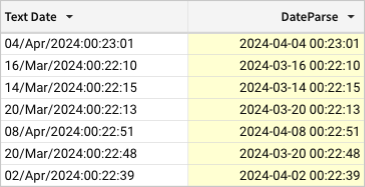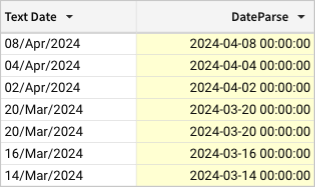DateParse
💡If the input is a text or number value that reflects ISO (YYYY-MM-DDorYYYY-MM-DD HH:MM:SS) or Unix time format, you can use the Date function, which doesn't require you to specify the input format.
Syntax
DateParse(text, format)Function arguments
Compatible format specifiers
📘Because two-digit years converted with the%yconversion are ambiguous, dates with a%yof 00–69 convert to 2000–2069 and dates with a%yof 70–99 convert to 1970–1999.
Examples
Example 1
Example 2

Example 3

Last updated
Was this helpful?